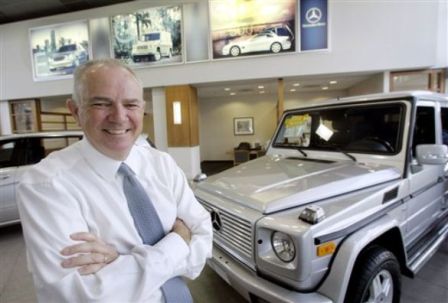Auto Nation CEO: High Gas Prices a Good Thing

The Wall Street Journal reports that Michael Jackson is joining a growing chorus shouting "take your medicine." No it's not MJ handing a can of Coke to a young fan. It's the CEO of mega-dealer AutoNation, who thinks "high gas prices are good for the U.S. auto industry." Just as Scott McClellan trash-talking the Bush administration, Jackson is biting the hand that feeds. "We are highly skilled at selling size, horsepower and speed at a premium price, and giving away fuel efficiency," Jackson opines. "Now, going forward over the next 10 years we are going to have to convince consumers why they should pay more for a smaller engine, or some new technology, that is going to give them a tremendous benefit on fuel efficiency." Surely it's a new day in the US of A when the top car salesman in the land embraces the challenge of selling fuel efficiency. Who's bad?

More by John Horner

































Comments
Join the conversation
High gas prices are a good thing, but not for cars. We only have to look at the latest report on cars sales to see the effect of high gas prices. High gas prices are especially dangerous for the auto manufacturers who have nothing competitive in the fuel efficient small car segment. The American 2.8 have fumbled the ball again as usual and are being left out of the sales game or what is left of it. They are in for very tough times and may not survive. They have no one to blame but themselves. Japanese auto makers saw it coming for the most part and prepared models like the hybrid Prius and Civic. They know about high oil prices and scarcity since Japan must import all the oil they use. All Detroit had to do was copy them as quickly as they made their move. Seems like the Prius has been available for 6 or 7 seven years now. But no, American arrogance and an unwillingness to change has been its downfall.
How to take care of nuke wastes? Yucca Mountain. I'm not gonna worry about ridiculously improbable what if events. You absolutely want to get the radwaste out of the trenches at Hanford - and other places - and into a safe repository. Yucca will do just fine. How much more CO2 can the atmosphere take? Dunno and neither do all the AGW proponents baying after that sweet, sweet grant money, money awarded by politicians who are mostly after more control over everyone's lives. Don't believe those researchers don't know? We have scientists predicting the climate 100 years from now. Show me a cite for their computer programs starting 100 years ago and successfully predicting today. They can't do it. Hell, they can't even conclusively demonstrate that CO2 is causative rather than a trailing indicator of warming. AGW is worse than a fraud, its a blunder in that we haven't gotten even the outline of an energy policy from it. Solar, wind? Sure, but neither will provide a significant contribution over the next decade. People who believe (and that is the operative word) otherwise have no sense of proportion. Nonetheless, bring on higher efficiency cars. I look forward to fewer big trucks and SUVs careering down the roads.
Why are you folks talking about nukes and solar? Oil has nothing to do with electricity production in the continential United States. 99.99% or so of all electricity production in the US is made with things other than oil. Oil is used in transportaion (boats/planes/trains/motorcycles/pickups/cars/SUVs/buses/big rigs) and plastics/chemicals/fertilizer, but not electric power. Oil has very little to do with electric production.